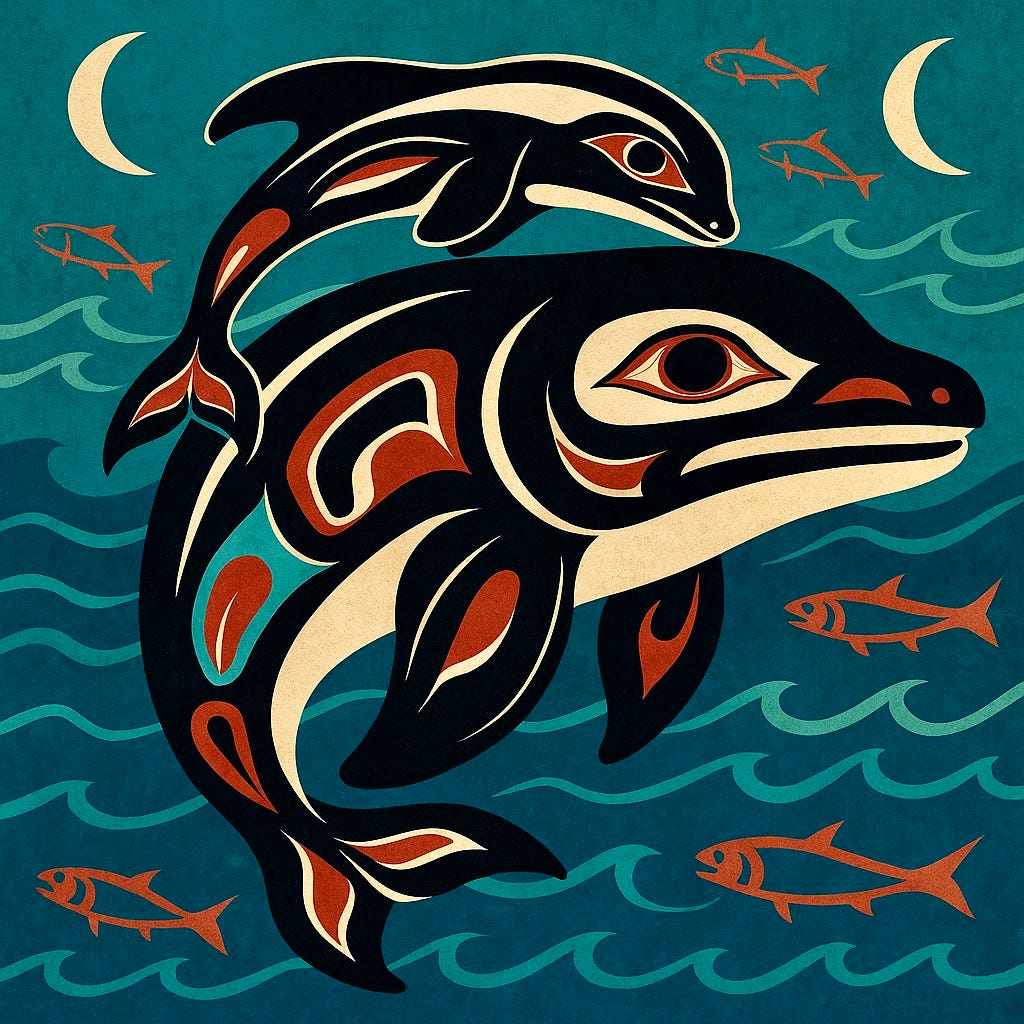Seventeen Days: Tahlequah’s Grief and the Echo of the Sea
This is not just a story of grief—it is a protest, a prayer, and a plea for survival in poisoned waters. Here, against a backdrop of industrial ruin and ancient memory, we bear witness.
The universal cry of spirit brings life to flesh.
Crystals of wisdom refract light into rainbows.
The sloppy, awkward beating of blood pushes back against mortality—
like some poisoned witness
awaiting the opportunity to testify
for, or against—
though in the end, it simply does not matter.
Here, against a backdrop of magnificence and malfeasance,
she emerges—
from the salty, frigid depths,
the rotting carcass of her child draped across her rostrum
like a macabre head covering.
A mother’s haunting wail of grief
draws the pod into a protective, nurturing circle.
A terror of whining drones buzzes overhead,
anxious as wasps.
Cameras spin online
as the world watches—
amused,
shocked,
horrified,
and unable to look away.
The unexpected majesty of another species.
Another iteration of the wild that lives within us all.
The lifeless infant on deliberate display—
an offering to the Orca gods.
Or perhaps a protest.
A cry for help,
for understanding.
One final, desperate plea
to the reckless humans
who decimated the Chinook
and poisoned the water.
Finally, Mali—
whose thirty minutes of life
were followed by seventeen days of decomposition—
is released to the sanctity of the deep.
And her mother,
Tahlequah,
with her pod,
returns to the long, slow fight
for survival in the Salish Sea.
🐋 Tahlequah’s Story: A Mother's Grief Made Global
In the summer of 2018, Tahlequah—designated J35 of the critically endangered Southern Resident orca population—made international headlines. Shortly after her female calf died only 30 minutes after birth, she carried the lifeless body atop her rostrum for 17 days and over 1,000 miles through the Salish Sea. For many, this image crystallized the powerful idea that non-human species experience intense emotions and grief.
This story moved me deeply, and inspired me to write the song Tahlequah, “A folk-ecological lament and a mother’s cry against polluted waters and dwindling salmon.”
I remember thinking—what does it mean when another species mourns so publicly, so painfully? What does it say about the soul of the sea, about a mother’s love, about our human responsibility?
I wanted the song to feel slow, tidal, and reverent—a lament not only for Tahlequah’s calf but for the decimated Chinook salmon runs, the poisoned waters, and the sacred interspecies bonds we so often ignore. The arrangement follows her journey: quiet grief, haunting repetition, and an open-ended return to the deep. The song begins with a somber acoustic guitar solo, before the lyrics take hold.
It’s not just a song—it’s an offering.
A way to bear witness.
You can listen to Tahlequah on Spotify or Bandcamp here,
Or watch the video on YouTube, recorded live on Jan Hall’s Folk Roots Radio
Here are the lyrics:
Tahlequah (Words and Music © Ken Dunn, socan, bmi)
The whole world was watching, you in so much pain
And you just lost your babe, but your dying anyway
Tahlequah, ah ah ah, Tahlequah, ah ah,
Tahlequah, ah ah ah, Tahlequah, Tahlequah
We are your creation, and about to fall
If you’re coming from the heavens, don't delay at all
Tahlequah, ah ah ah, Tahlequah, ah ah,
Tahlequah, ah ah ah, Tahlequah, Tahlequah
I could use a little help here, cause everything is gone
Tell me that you love me, and you won't be long
Tahlequah, ah ah ah, Tahlequah, ah ah,
Tahlequah, ah ah ah, Tahlequah, Tahlequah
Aho Matakyawe Oyasin, we really are the same
Lest you be forgotten, I will call your name…
Tahlequah!




